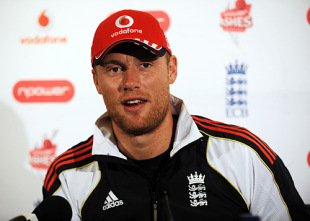- England news
Flintoff admits to battle with depression

Andrew Flintoff, the former England captain and allrounder, has revealed he went through a phase of depression during the 2006-07 Ashes in Australia, where, as captain, he was at the receiving end of a 5-0 whitewash. Flintoff admitted he wasn't aware then of what exactly he was suffering from, but the illness drove him to drink and lose his love for the game.
A year earlier, Flintoff was the toast of the nation for helping England regain the Ashes after 18 years.
Flintoff is now among several high-profile cricketers, particularly from England, who've been plagued by the illness during their playing careers. Flintoff, who quit the game in 2009, will explore the problems suffered in private by sportsmen in a BBC 1 documentary: Freddie Flintoff: Hidden Side of Sport.
"I was having a quiet drink with my dad Colin on Christmas Eve 2006 and as we made our way home I started crying my eyes out," Flintoff told the Daily Mail. "I told him I'd tried my best but that I couldn't do it any more, I couldn't keep playing. We talked and, of course, I dusted myself down and carried on. But I was never the same player again.
"I was captain of England and financially successful. Yet instead of walking out confidently to face Australia in one of the world's biggest sporting events, I didn't want to get out of bed, never mind face people."
Flintoff took over the captaincy from the injured Michael Vaughan after the 2005 Ashes win and enjoyed mixed results. He helped England square the Test series in India in 2006 and the expectations grew when England landed in Australia at the end of the year. It was also the same series in which his team-mate Marcus Trescothick suffered a breakdown at the start of the tour due to depression and separation anxiety and never played for England again after that.
After leading England to a come-from-behind win in the one-day tri-series in Australia, Flintoff handed the captaincy back to Vaughan before the World Cup. Flintoff was stripped of the vice-captaincy after a drunken night out following England's defeat against New Zealand in a World Cup match in St Lucia, which culminated in falling off a pedalo.
"The whole time I was on the field and throughout that World Cup all I could think about was that I wanted to retire," Flintoff said. "I didn't understand what was happening to me. I knew when I got back to my room I couldn't shut off, which is why I started having a drink. It got to the stage where I was probably drinking more than I should.
"All I wanted was for the doctor to tell me what was wrong but no one suggested it was depression."
He said his condition was so serious that even victory meant nothing. "There's a certain sense of shame when I remember sitting in the dressing room after winning a one-day international in the West Indies," he said. "The lads were celebrating and I didn't want to be a part of it, I didn't want to do anything but sit on my own in the corner.'
Cases of depression in modern sport aren't uncommon and Flintoff admitted that he wasn't as aware of the problem as he should have been. "Because sporting stars earn high salaries and have a privileged life compared to the majority of people, there's a perception that they can't possibly suffer from mental health issues. They don't want to seem ungrateful or whingeing and may be hiding their suffering rather than getting help for it."
Besides Trescothick, other England players who've admitted suffering from depression include Flintoff's close friend Steve Harmison, Michael Yardy and Matthew Hoggard. New Zealand players Iain O'Brien and Lou Vincent have also suffered similar problems.

